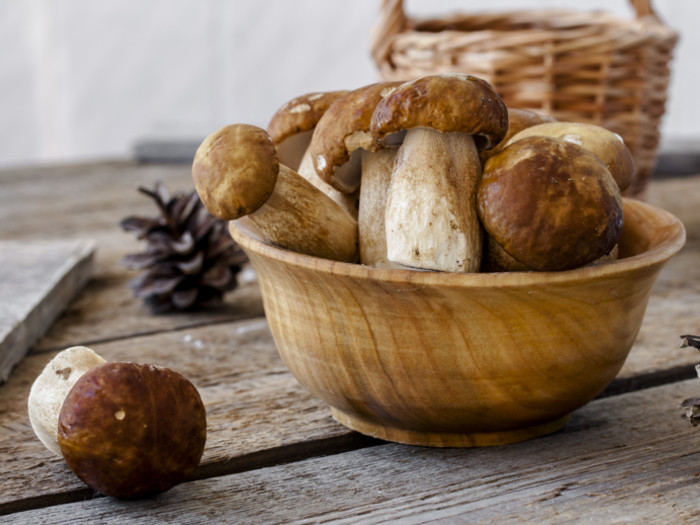Porcini mushrooms are delicious and nutrient-dense additions to your kitchen that hold some surprising health benefits!
What are Porcini Mushrooms?
Porcini mushrooms are a type of fungus scientifically known as Boletus edulis but commonly referred to as penny bun, cep, or porcino. Common in the Northern hemisphere, these mushrooms can grow to be quite large, with the brown caps growing to over 1 foot in diameter, and weighing as much as 6 pounds! Famous for their use in culinary applications, these rich, meaty mushrooms are popular ingredients in pasta, soup, and risottos. While some wild mushrooms are toxic or dangerous to consume, porcinis are completely edible and highly sought after in culinary circles. These mushrooms have an earthy and potent smell, which provides a rich and textured flavor to many dishes. [1] [2]
The best time to get fresh porcinis is during the spring or autumn, but for the rest of the year, they are available in a dried form that can also be very versatile in the kitchen.
Porcini Mushrooms Nutrition
When it comes to nutrition, porcini mushrooms are very good sources of protein and dietary fiber, with 100 grams of these mushrooms delivering 2 grams of fiber and 3 grams of protein. The same serving size only has 25 calories and absolutely no fat. As for minerals, these mushrooms are high in potassium, calcium, and iron, as well as vitamin C, vitamin A, and B-complex vitamins. There are also certain antioxidants in these fungi, such as beta-carotene and lycopene. [3]

Porcini mushrooms have an earthy flavor. Photo Credit: Shutterstock
Health Benefits
The top benefits of eating porcini mushrooms include their ability to aid weight, improve growth and development, and reduce inflammation, among others.
Weight Loss
Low in calories, but high in nutrients and dietary fiber, these mushrooms can help you feel full and prevent overeating or unnecessary snacking between meals. [4]
Antioxidants
With good levels of beta-carotene, vitamin C, and lycopene, these mushrooms are a rich source of antioxidants that can counter oxidative stress and chronic inflammation in the body.
Digestive Health
Dietary fiber is extremely important for digestion and gut health, and with 2 grams of fiber in every 100 grams of these fungi, they can help eliminate constipation and other digestive issues. [5]
Immune System
With high levels of vitamin C, these mushrooms can boost the body’s defenses and production output of white blood cells.
Colon Cancer
A study published in 2016, as well as 2017 research paper, have found that regular consumption of these specialty mushrooms can help to kill colon cancer cells and cause them to undergo apoptosis. This is attributed to the presence of ribonucleic acid in penny buns. [6] [7]
Inflammation
Various anti-inflammatory compounds and substances in these mushrooms will offer relief from arthritis, muscle strain, and other common inflammatory conditions.
Anti-Ulcer
More research needs to be done, but some of the volatile components in these mushrooms are believed to help reduce the size and severity of ulcers. [8]
Others
It can also be eaten to have hypoglycemic and antitumorigenic effects on the body.
How to Use Porcini Mushrooms?
There are many ways to use porcini mushrooms in our daily diet, including the following:
- Soups
- Pasta sauces
- Risottos
- Casseroles
- Gratins
You can grill these mushrooms with olive oil, or roast them in the oven, but be careful not to overcook them. As mentioned, these mushrooms are often purchased in a dried form, which you can soften in a bowl of water for 10-15 minutes before adding to a dish. You can also grind up these mushrooms to enjoy the flavor if you don’t like the texture. [9]
Side Effects
There are a few potential side effects to consider when eating these mushrooms, such as irritation in the stomach, and the risk that the mushrooms could contain heavy metals and toxins. Some people are also allergic to this variety of mushrooms. Purchasing these mushrooms from a reliable grocery store is the best option, rather than trying to collect them yourself from the wild.
